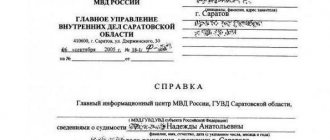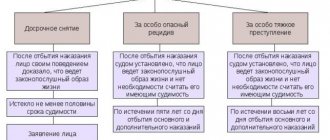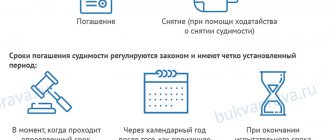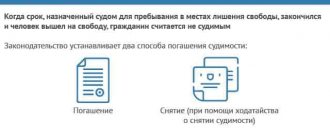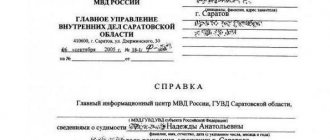A criminal record is the legal status of a person who has been convicted of a crime he has committed.
It is social and criminal consequences for the person
According to the Criminal Code of the Russian Federation, the terms for expunging a criminal record are determined based on the severity of the crime committed and the punishment awarded by the court. This concept is related to the expungement of a criminal record, but there are differences between them, so a closer study is required.
When is a criminal record expunged?
A criminal record is expunged in two cases.
The first is the expiration of the term of serving the sentences established by the sentence. The second is the end of the probationary period.
For some categories of crimes, it is enough to pay a fine .
Deadlines for expunging a criminal record depending on the type of punishment
In Part 3 of Art. 86 of the Criminal Code of the Russian Federation establishes the terms for expunging a criminal record, taking into account the types of punishments and crimes:
- for suspended sentenced persons - the end of the probationary period:
- for persons who received more lenient punishments than imprisonment - the expiration of 1 year from the moment the punishment was served or executed;
- for those convicted of offenses of moderate or minor gravity - the expiration of 3 years after serving the sentence;
- for those convicted of serious crimes - 8 years after serving the sentence;
- for those convicted of especially serious offenses - 10 years after serving the sentence.
Calculation of the period for expiration of a criminal record
According to the law, the calculation of the expiration period for a criminal record starts from the moment the citizen is released from serving his sentence .
In Part 4 of Art. 47 of the Criminal Code of the Russian Federation there is a special instruction on this issue.
If deprivation of the right to hold certain positions or engage in any activity is an additional punishment to restriction or deprivation of liberty, arrest, or detention in a disciplinary military unit, it applies to the entire period of serving the main penalty.
However, its term is calculated from the moment the main type of punishment ends.
The legislation in force for 2021, unlike the Criminal Code of 1960, does not provide for the possibility of interrupting the period for expunging a criminal record. This rule applies even if a relapse occurs before its end . In this case, the terms for expunging a criminal record are calculated for each crime separately.
Situations arise when a conviction for a first offense is expunged while serving a sentence for a subsequent crime. Another option is also possible. It is possible that for a newly committed crime, the expiration date for a criminal record will expire earlier than for the first one.
In Part 2 of Art. 86 of the Criminal Code of the Russian Federation there are instructions regarding punishments without imprisonment. In such cases, a criminal record is considered expunged one year after serving the sentence or after its execution. So, if there is a fine, it is enough to pay it in full.
The expiration period for a criminal record on parole is calculated taking into account the actual sentence served from the moment the citizen is released early .
in the event of a commutation of punishment is regulated differently if the perpetrator actually served two types of sentences. The initial one is considered to be the one listed in the verdict.
Let's say, according to Part 3 of Art. 50 of the Criminal Code of the Russian Federation, correctional labor was replaced with imprisonment because it was ignored. In such a case, the period for expunging a criminal record will be calculated taking into account the punishment in the form of imprisonment.
If the criminality and punishability of the act are eliminated, the person who was convicted of committing it is recognized as having no criminal record . This happens immediately after the new law comes into force.
Features of expunging criminal records for minors
Separately, the law regulates the terms for expunging criminal records for minors.
They are shortened for this category of citizens.
For adults, the expungement period for convictions for crimes of minor and moderate gravity is 3 years, for serious acts - 8 years. However, for children and adolescents, the corresponding periods are 1 year and 3 years.
Convicts under 18 years of age, sentenced to compulsory educational measures for crimes of minor and medium gravity, do not have a criminal record at all on paper.
Expungement of convictions for serious crimes
In 2013, the expiration period for a conviction for a serious crime was increased by 2 years - from 6 to 8 years . The law that made adjustments to Part 3 of Art. 86 of the Criminal Code of the Russian Federation, signed by Russian President Vladimir Putin. The document also increased the expiration period for convictions for especially serious crimes from 8 to 10 years.
The authors of the law explained that too often people previously convicted of serious crimes commit a recidivism after expunging their criminal records. At the same time, according to Part 6 of Art. 86 of the Criminal Code of the Russian Federation, when a criminal record is expunged, all legal consequences caused by it are annulled.
Deadlines for expunging a criminal record - comments from a Federal Judge / MIP Law Group
This measure of influence can be applied exclusively to a minor, who is exempt from responsibility and the punishment itself. There are exceptional cases established by the Criminal Code, which make it possible to apply educational influence to adults aged 18-20 years.
The basis for their use is the minor’s lack of criminal record, as well as the commission of a criminal act characterized by minor or moderate severity. The court must have an internal conviction that, thanks to educational influence, the correction of the minor will be achieved. In some cases, the court may impose several compulsory educational measures on a minor at the same time.
Systematic failure to comply with the re-education measures determined by the court is the basis for transferring the case materials to the court again, the purpose of which is to assign criminal liability to the minor, which entails a criminal record.
As educational measures, it is necessary to understand the moral impact in relation to the subject of a criminal act, which includes explanatory work. Persons carrying out such influence are obliged to explain to the minor what harm the latter caused by his act, as well as the scope of the consequences that took place and that may arise if similar actions are repeated.
Often, the application of educational measures is entrusted to parents or other persons who replace them, as well as to government bodies under whose supervision the minor is.
The presence of a minor’s own income or property may become the basis for collecting from him the monetary equivalent of the harm that was caused by his act.
The commission of a crime of moderate gravity by a minor may become the basis for the subject of the illegal act to be released from actually serving the sentence. A mandatory condition for such release will be the court's opinion that the purpose of the punishment can be achieved as a result of sending the minor to specialized educational or treatment institutions.
The period of stay of minors in institutions of this type cannot be longer than the maximum sentence imposed for the act committed by them. The Criminal Code provides for a number of grounds allowing parole to be applied to a minor serving a sentence. A prerequisite for this is the fact that at least a third of the term assigned by the court for acts characterized by minor or moderate gravity has been served. Parole can be applied to serious crimes, when at least half of the assigned sentence has been served, as well as for especially serious crimes, if at least two-thirds of the sentence has been served.
The provisions of Art. Art. 78, 83 of the Criminal Code stipulate that the statute of limitations applicable to acts involving minors must be reduced by half. The statute of limitations for an act of minor gravity is one year, for crimes of average gravity - 3 years, for serious crimes - 5 years and for especially serious ones - 7.5 years.
As such terms, it is necessary to understand the period of time determined by the legislator, after which measures of criminal law cannot be applied to minors who have committed acts with a public danger.
The current legislation regulated the periods after which a juvenile criminal record is considered expunged. A minor's criminal record represents a number of restrictions of a general legal nature that affect his adaptation in public circles.
Having a criminal record is the basis for certain criminal legal consequences, which are of particular importance if the minor commits a criminal act again.
The criminal law establishes shorter periods, after which the minor is restored to his civil rights in full. The size of such terms is the main difference between the expungement of criminal records for persons under the age of majority and adults.
Thus, the expiration of a minor’s criminal record is carried out after one year if the act was of minor or moderate gravity, as well as three years for committing grave and especially grave crimes.
Differences between expunging a criminal record and expunging a criminal record
Due to the similarity of concepts, the question often arises: “What is the difference between expunging and expunging a criminal record?”
The answer can be found in the criminal code.
A criminal record arises after a judge has rendered a guilty verdict and imposed a penalty.
In Part 1 of Art. 86 explains that a convicted citizen is recognized as having a criminal record from the moment the sentence comes into legal force, and remains so until the criminal record is expunged or removed.
Expungement of a criminal record means the automatic completion of the period of its implementation after the expiration of a certain period , which is prescribed by law. The court does not make special decisions on this issue.
Therefore, early expungement of a criminal record is impossible . It is repaid only after the completion of the probationary period or upon the expiration of the term established by law after serving the sentence. Also, early expungement of a criminal record is possible due to an act of amnesty (Article 84 of the Criminal Code of the Russian Federation) or pardon (Article 85 of the Criminal Code of the Russian Federation).
When a criminal record is cleared, it is annulled by issuing a special court decision. According to Part 5 of Art. 86 of the Criminal Code of the Russian Federation, it is permissible to expunge a criminal record. This serves as a measure of criminal law incentives for a citizen for good behavior.
If, after serving his sentence, and once released, a person behaves ideally, then his criminal record can be expunged before the expiration of the period after which it can be expunged.
The minimum period after serving a sentence, after which a criminal record can be expunged, is not specified in the law. However, it must be sufficient for the citizen to be able to prove that he has reformed.
Expungement of a criminal record is carried out automatically within the time established by law after the person has served his sentence . This period is influenced by both the type of punishment and the type of illegal act.
The minimum period for expiration of a suspended conviction is the expiration of the probationary period. For persons who have committed particularly serious crimes, it is set at a maximum of 10 years.
If a citizen behaves approximately after serving his sentence, the court will remove his criminal record by making a decision in a special manner.
Video: Criminal Code of the Russian Federation, Article 86, Criminal record
Procedure
As mentioned above, the convicted person himself can initiate the removal of a criminal record. To do this, the perpetrator of the crime must submit a petition to the bodies of the Criminal Executive Inspectorate to remove the suspended conviction. This document must contain:
- information about the convicted person;
- information about the territorial authority of the UII to which the application is sent;
- a request to send a motion to the court to expunge a criminal record;
- motivation for the request: information about repentance, admission of guilt, compensation for damage caused by the act, other reasons that may serve as a basis for withdrawal.
The text of the document may also contain references to the norms of criminal and criminal procedural legislation. The petition must also be accompanied by documents indicating that the convicted person has fulfilled all the conditions under which a criminal record can be expunged.
Cheat sheet Table of contents
^ (Article 79 of the Criminal Code of the Russian Federation) - a type of conditional release from punishment applied by the court to a person serving detention in a disciplinary military unit or imprisonment, when it is recognized that for his correction the convicted person does not need to fully serve the sentence assigned to him.^ - the conviction of the court that the convicted person does not need to serve the full sentence imposed by the court for his correction.^ - he must serve a certain part of the sentence. The size of this part is determined in Art.
79 of the Criminal Code of the Russian Federation based on the severity of the crime committed. Thus, it is necessary to serve at least 1/3 of the sentence imposed for a crime of minor or moderate gravity; at least 1/2 term - for a serious crime; at least 2/3 of the term - for a particularly serious crime. When applying conditional early release from punishment, the court may impose on the person the obligations provided for in Part.
5 tbsp. 73 of the Criminal Code of the Russian Federation, which must be executed by him during the remaining unserved part of the sentence.^ (Art.
80 of the Criminal Code of the Russian Federation) is an unconditional type of release from punishment applied by the court to a person serving a sentence of imprisonment for a crime of minor or medium gravity, taking into account his behavior and after he has actually served at least one third of the sentence.45. Exemption from punishment due to changes in situation and illness. Amnesty and pardon1. Exemption from punishment due to a change in the situation (Art.
80.1 of the Criminal Code of the Russian Federation) is allowed in relation to a person who has committed a crime of minor or moderate gravity for the first time, if it is established that, due to a change in the situation, this person or the act he committed has ceased to be socially dangerous. A change in the situation should be understood as a change not only in social and political conditions in the country , but also a change in the specific situation in a particular region, district, locality, enterprise, institution, as well as a change in circumstances characterizing the personality of the perpetrator and the degree of his danger in connection with his crime.
Sources
- Andreevsky Sergey The Case of Bogachev: monograph. ; Science - Moscow, 2020. - 602 p.
- Rules for recreational fishing in reservoirs of fishery importance in the Tver region. Reference publication / Team of authors. - M.: Publishing solutions, 2015. - 206 p.
- Labor Code of the Russian Federation with comments. Text with changes and additions as of June 25, 2012 / Team of authors. - Moscow: Mir, 2012. - 642 p.
- Sushkevich, A.G. Application of legislation on competition protection to foreign persons and organizations / A.G. Sushkevich. - M.: Synergy, 2007. - 376 p.
- Tatyana, Viktorovna Evdokimova Features of the Russian intellectual property market in the context of participation in the WTO. Monograph / Tatyana Viktorovna Evdokimova. - M.: Prospekt, 2006. - 925 p.
